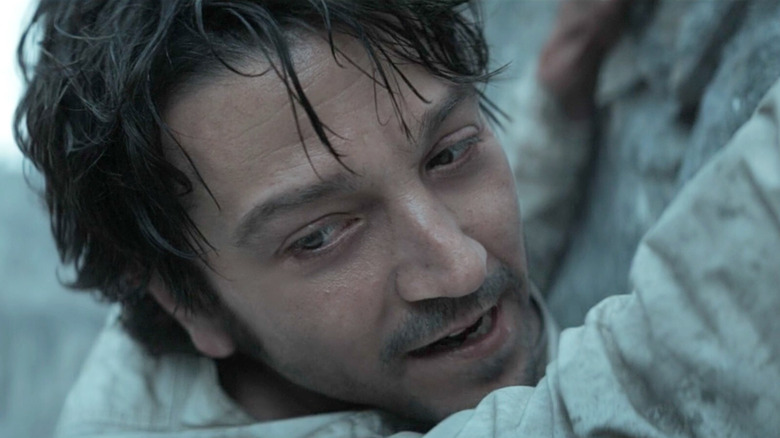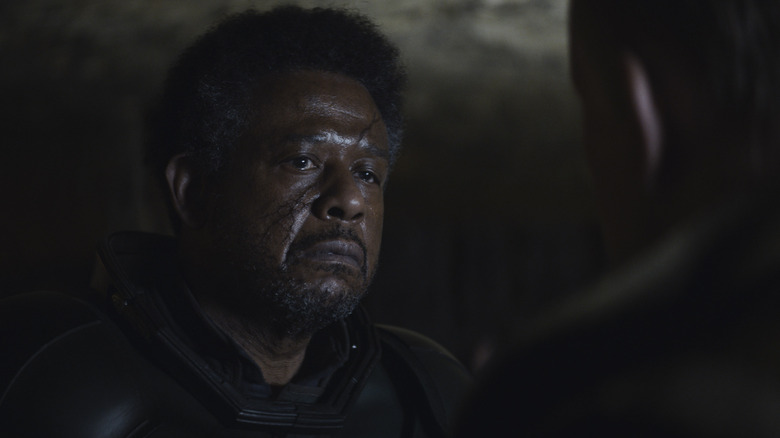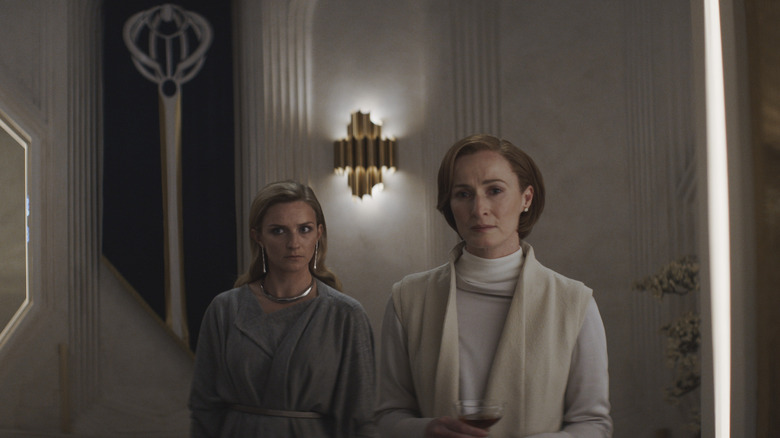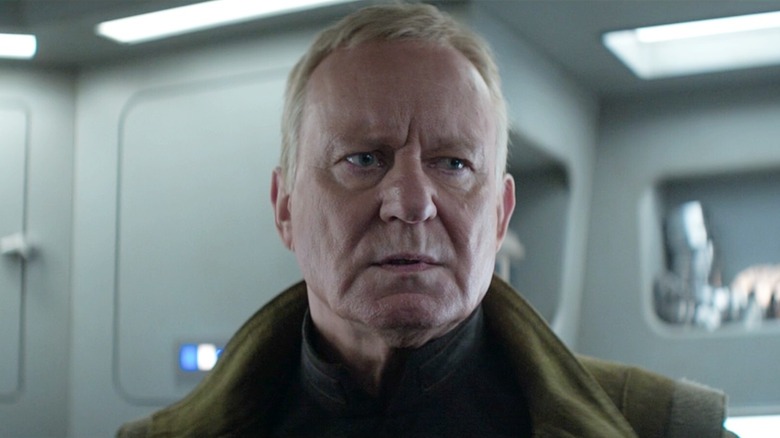In Andor Episode 11, The Biggest Threats To The Rebellion Are The Tiniest Details
One way out ... of this article, that is, for those who haven't watched the latest episode of "Andor." Spoilers abound!
Compared to the movie that "Andor" first originated from, the prequel/spin-off series sometimes runs the risk of appearing downright uneventful next to the epic heroism of "Rogue One: A Star Wars Story." While the standalone film depicted some of the biggest and most spectacular battles in "Star Wars" history, the action in "Andor" feels far more restrained and low-key. In fact, two of the show's most extravagant set pieces only appeared recently: last week's prison break and the unexpected dogfight that comes near the close of episode 11. Other than that, the Diego Luna-starring series has been content to carve out its own distinct niche amid this larger-than-life franchise, savoring the smallest details that most other stories would ignore completely and instead treating them with a deadly sense of seriousness.
That pattern may have reached its peak in last night's episode of "Andor," to even more thrilling results. More than any other hour to this point, episode 11 (evocatively titled "Daughter of Ferrix") truly reinforces the idea that the devil is squarely in the details. Everything stands on the edge of a knife for the organization that will soon become the Rebellion, eking out the beginnings of a full-blown uprising from under the Empire's very nose. But with great reward comes great risk, as this penultimate episode seems intent on reminding audiences.
Through several of its major characters, we see again and again how the spark that will eventually light the fire almost gets snuffed out before it can get started — all thanks to some of the smallest and most seemingly insignificant details, all of which come loaded with massive consequences.
The greater good
Any fan of war movies and espionage will easily recognize the moral quandary that "Andor" thrusts upon two of its supporting characters in this latest episode. The good guys find out that their plans for a sneak attack have been uncovered by the enemy, putting them in a uniquely unenviable position. Do they call off the attack, saving innocent lives but revealing that they received inside knowledge from an informant, or proceed with their plans as usual and sacrifice an entire group of soldiers, preserving their double agent in the process? This chilling and costly decision never would've even become an issue if it weren't for the one brief conversation between Luthen Rael (Stellan Skarsgård) and the spy Lonnie (Robert Emms), forcing the rebels into this impossible corner.
"Andor" puts the screws on both viewers and its own characters during a visit to the firebrand soldier Saw Gerrera (Forest Whitaker). When Saw suddenly reverses course and expresses an interest in joining up with Anto Kreegyr on the planned mission, Luthen has no choice but to reveal that the attack is a lost cause to begin with. This risky move results in one of the most tense scenes in the entire episode.
More importantly, however, this quick meeting between Luthen and Saw looms much larger for the Rebellion. As we see in "Rogue One," Saw plays a huge role in connecting Jyn Erso (Felicity Jones) with her father Galen (Mads Mikkelson), the architect of the Death Star and the conduit for revealing its major weakness. Without Saw, there's no tearful reunion between the Ersos, no chance to recover the Death Star plans, and, ultimately, no "Star Wars" as we know it. This one seemingly minor moment in one stray episode of "Andor" proves to have galaxy-wide ramifications.
Risk of exposure
The entire characterization of Mon Mothma (Genevieve O'Reilly) continues to be a standout from episode to episode. Imbued with a sense of tragedy and heartbreak that was never so much as even hinted at in the original "Star Wars" trilogy (when the character was portrayed by Caroline Blakiston) or even "Rogue One," the depiction of her fraught family life and political maneuvering in service of the Rebellion in "Andor" has added layers and deepened the character immeasurably. But perhaps more than most other characters, the worsening situation that the Chandrilan finds herself in best reflects the show's attention to detail.
The central tension of Mon Mothma's storyline in "Andor" revolves around her fear and paranoia of having her secret Rebellion sympathies uncovered by the Empire. At this point in the "Star Wars" timeline, the Galactic Senate still exists and Palpatine's gross overreach of power still stands a faint chance of being curtailed through democracy. (Boy, does that sound relevant these days?) But for Mon Mothma, the successful heist on Aldhani has only made life more difficult. With the Empire clamping down in response and the Senator unable to access her wealth of family funding to keep the Rebellion going, one stray accounting irregularity that she couldn't quite solve threatens to blow up in her face and undo all the progress she's made.
This single lapse leads to her desperate bid to enlist the services of both childhood friend and fellow politician Tay Kolma (Ben Miles) and, more sinisterly, the banker Davo Sculdun (Richard Dillane), who quickly proposes one of the most disturbing arrangements we've ever seen in this franchise. The stakes couldn't be higher for Mon Mothma and the Rebellion, tightening the noose and threatening to rob Luthen of his greatest financial ally.
A narrow escape
The history of real-world warfare and spying is littered with countless instances of near-misses and close calls, where only sheer luck and happenstance saved entire operations from total calamity at the worst possible moment. No matter how skilled or well-prepared they may be, nobody tends to get the last laugh on luck. Even "Star Wars" characters have to learn this hard lesson on occasion, especially on a show like "Andor" that's utterly bereft of narrative "cheat codes" like lightsabers or the Force.
Nobody knows this better than Luthen, the lifelong servant of the rebel cause who ends up in the most amount of mortal danger he's experienced since his extraction of Cassian way back in the earliest episodes on Ferrix. Though some may have wished for a more dramatic outcome, it's not some backstabbing traitor or an unnecessary risk that nearly dooms the mastermind of the early Rebellion ... it's, essentially, a traffic stop.
Returning from his meeting with Saw, Luthen runs afoul of a routine inspection by an Imperial cruiser. Of all potential targets to bully, the Empire decides to flex their muscle by unwittingly picking on the central figure (codenamed by Denise Gough's Dedra Meero as "Axis") of the Imperial Security Bureau's hunt for Cassian and other rebel activity. Lifelong spies, both fictional and otherwise, have seen their life's work come crumbling down through similarly as mundane circumstances, but there would've been something keenly tragic about seeing Luthen taken down in such undignified fashion — particularly after his show-stopping monologue last week.
Instead, "Andor" allows us at least one moment of victory when this inglorious dilemma instead becomes a fist-pumping catharsis, letting Luthen get away in badass style. By staying fiercely committed to the little details, both failures and triumphs loom larger in "Andor."



